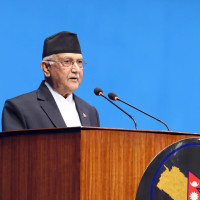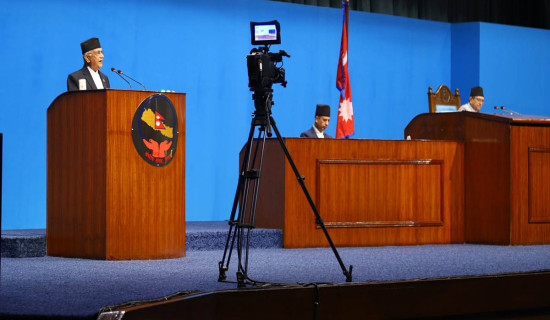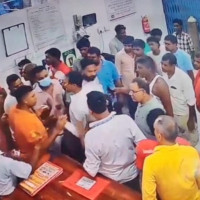- Wednesday, 23 July 2025
Visionary Pushpa Lal
Comrade Pushpa Lal, the founding father of the Nepal communist movement, came from a martyr family. A second brother of the great martyr Gangalal, he was a brilliant boy from his early days. He was born at Bhangeri of Ramechhap on June 28, 1924, and breathed his last at the Govinda Ballav Panta Hospital in New Delhi on 22 July 1978. He had nurtured a strong radical thinking and thought to do something for the welfare of the huge majority of the exploited people. For that, he felt the need for a consciously organised group that could analyse and advocate all problems of the Nepali people languishing under the autocratic Rana regime. He first joined the then National Congress Party for the very cause. Unsatisfied with its leaders' activity, he took initiative to establish the Communist Party of Nepal (CPN) on 15 September 1949. It marked a historic moment in the nation's political annals.
The CPN's primary goal was to end the autocratic Rana regime, feudalism and imperialism. As the founding general secretary of CPN, Pushpa Lal played an important role in the 1950/51 revolution that overthrew the Rana regime. In the party's first congress held clandestinely in Patan in 1954, Manmohan Adhikari accused Puspalal of "exploiting his intellectual brain," and started lobbying against the latter. Adhikari was elected general secretary. The CPN held its second party congress openly in Kathmandu in 1957. It adopted a republican programme and picked Keshar Jung Rayamajhi as a new general secretary. Nonetheless, the 2nd convention became a big paradox.
On December 15, 1960, King Mahendra staged a royal coup and banned all political parties. A wave of repression against all political parties, the CPN and Nepali Congress, was initiated by the government. Contrary to the core principle of the party, Rayamajhi showed allegiance to the monarchy, triggering strong reactions from within and outside the party. To resolve the conflict, a Central Plenum was convened in Darbhanga, India, which lasted for one month.
Three political lines emerged in the extended meeting. Raymajhi stood for the constitutional monarchy but Pushpalal called for the restoration of the dissolved parliament and the launch of broad mass movements based on common minimum political consensus against the kingship. Mohan Bikram Singh favoured a constituent assembly, which fell in a minority. But history has proved that comrade Pushpa Lal's line was correct and practical at that time.
Now, almost all the communist parties of Nepal pretend to follow the path shown by Pushpa Lal and regard him as their respected leader but most of them do not follow his revolutionary programme - 'New Democracy' that seeks radical transformation of Nepali society and is also a tactical line of united struggle of exploited and oppressed Nepalis. In fact, Pushpa Lal was a man of great vision and mission, as justified by the 1990 people's movement and the 2006 peaceful uprising. Both communist and democratic forces had joined hands against the dictatorial monarch in both movements.
Pushpa Lal repeatedly insisted on the unity between the communist and Nepali Congress to topple the feudal Panchayat system. His dreams, wishes and aspirations of making Nepal free of class exploitation and social oppression have not been fulfilled yet. We can pay a true tribute to him by only fulfilling these aspirations. He has always inspired all the revolutionaries and
progressive forces to be sincerely dedicated to the country and people. Long Live comrade Pushpa Lal!





-square-thumb.jpg)




-original-thumb.jpg)





